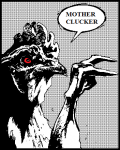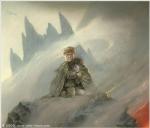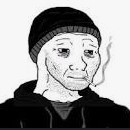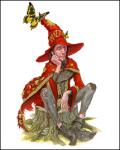I've had a bit of time to think about it, so here's my thoughts on
Dredd
First of all: I wouldn't necessarily class myself as a fan of the character, but I am a British male sf fan in his 40s, so
2000AD and the character of Judge Dredd are a significant part of my childhood. There's a story about a US comic book writer who was curious as to why British comic book fans (and writers) of a certain age are all a bit odd; the answer is that we grew up reading
2000AD and other British Boys comics in the 70s and 80s, which were cynical, satirical, excessively and sadistically violent, subversive and profoundly anti-authoritarian. Which brings us to
Dredd
They've done something quite interesting with the film; it's not really about Dredd at all, it's about Anderson. This is actually a smart move, as the character of Dredd has nowhere to go. He starts and finishes the movie as essentially the same person (barring a small and entirely obvious change of mind). He just is. And that's fine because it's true to the character; Dredd doesn't change because he can't - and he shouldn't.
They've also kept the ambivalence about the characters. Dredd and Anderson are the embodiment of a fascist state, their actions might be heroic (at times) but what they represent is not. From time to time the film reminds us of that.
They've also done something interesting with the world; they've grounded it in reality. This isn't a neon lit, hyper advanced city of the future, it's more a gigantic, festering exaggeration of the cities of today. For the most part it works, although the contemporary vehicles and firearms do jar you out of the make believe at times (this I expect, is primarily due to the film's relatively small budget)
This film is violent. I mean, it's
really violent. There's no skimping on the gore. There's blood and brains everywhere. Which also works. Comic book movies (barring notable exceptions like
300) have tended to studiously avoid the consequences of violence in their search for a wider audience. This one is uncompromising. The casual brutality of the source material is very present. Interestingly, the women in this film, unlike in most action movies, are not simply there to be victims, tittilation or damsels in distress. They can, and do, look after themselves very effectively.
The slow-motion effects, showing the viewer the effect of a fantastical drug, are actually quite neat. The washed out colours of the world become super saturated, and mundane (and sometimes horrific) actions become paradoxically beautiful. You can see why people might actually want to take a drug like that.
Acting wise, most acquit themselves moderately well. Karl Urban channels the Dirty Harry-era Clint Eastwood that served as inspiration for the character in the first place. Olivia Thirlby has a trickier job as Anderson, being the audiences viewpoint character, but manages it. Lena Heady is a suitably wicked, if broadly drawn villain.
The film doesn't outstay its welcome and ,to quote Hobbes, is "nasty, brutish and short". But in a good way. It's not a great moment in cinema history, by any stretch of the imagination, but it pretty much succeeds at everything it sets out to do.
If an opinion contrary to your own makes you angry, that is a sign that you are subconsciously aware of having no good reason for thinking as you do. If some one maintains that two and two are five, or that Iceland is on the equator, you feel pity rather than anger, unless you know so little of arithmetic or geography that his opinion shakes your own contrary conviction. Ö So whenever you find yourself getting angry about a difference of opinion, be on your guard; you will probably find, on examination, that your belief is going beyond what the evidence warrants. Bertrand Russell
 QuickTidal, on 28 August 2012 - 01:06 PM, said:
QuickTidal, on 28 August 2012 - 01:06 PM, said:
 Help
Help






















